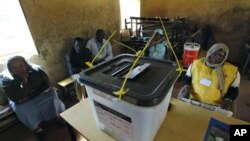Voting in very high numbers is continuing in South Sudan’s independence referendum, while violence persists in the Abyei border region with the north. Africa experts in the United States are worried about long term prospects for peace.
Voters have been lining up at voting stations in massive numbers during the week-long referendum to decide whether South Sudan will become a new African country.
One of them, Yohana Deng, is looking forward to no longer having to pledge allegiance to Sudan’s government in Khartoum. “OK I am saying 'bye bye Khartoum', it is finished. Everything from today is finished. Bye Bye. Bye Bye,” Deng said.
A vote for separation is widely expected.
The referendum comes as part of the internationally-brokered 2005 Comprehensive Peace Agreement, or CPA, which ended two decades of fighting between the north and south.
A separate referendum was supposed to take place in the oil-rich Abyei border region. But it was postponed because of a number of issues, including whether the Misseriya herdsmen who pass through the area to graze their cattle should be allowed to vote.
As voting began in the south, violence broke out in Abyei between the pro-Khartoum Misseriya, local residents of other tribes, and security forces.
“Our tribe does not initiate an attack, but if attacked we have a right to defend ourselves with ten times the force used, no matter how powerful the attackers are. Abyei is connected to our life style, and depriving it from us would be like a death sentence,” said El-Sadiq Babu Nimir, a Misseriya tribal leader.
In Washington, a panel of experts expressed concern at the situation. “While securing the referendum has been an international priority, the long-term stability of the region lies in the ability of the north and south to forge a post-CPA relationship,” said Comfort Ero, the Africa program director for the Brussels-based International Crisis Group.
Fouad Hikmat, a Kenya-based expert on Sudan issues, says despite the strong voter turnout in the south, there is little reason yet to be optimistic. “There is serious nervousness and volatility. That is where this procedure is happening and at the same time, there is no full agreement on any of the post-referendum issues. None,” Hikmat said.
Those "post-referendum issues" include the exact demarcation of borders, the sharing of revenue for southern oil going through northern pipelines, as well as what to do with Abyei.
Results of the southern referendum are expected early next month.

















